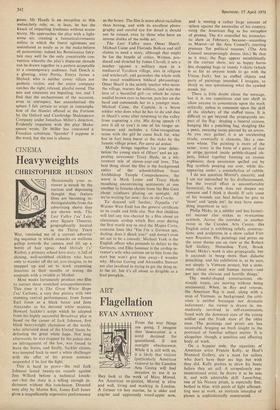CINEMA
Heavyweights
CHRISTOPHER HUDSON
Most weeks fortunately produce one film to correct these wretched misapprehensions. This time it is The Great White Hope ('AA' Carlton), a very fine picture with two stunning central performances, from James Earl Jones as a black boxer and Jane Alexander as his devoted white mistress. Howard Sackler's script which he adapted from his highly successful Broadway play is based on the career of Jack Johnson, first black heavyweight champion of the world, who infuriated most of the United States by defeating the great white hope. Not long afterwards, he was trapped by the police into an infringement of the law, was forced to leave the States, and finally, Sackler claims, was tempted back to meet a white challenger with the offer of his prison sentence suspended if he lost the fight.
This is hard to prove—the real Jack Johnson lasted twenty-six rounds against Jess Willard before a technical knock- out—but the story is a telling enough in- dictment without this conclusion. Directed very ably by Martin Ritt, James Earl Jones gives a magnificently expressive performance as the boxer. The film is more about racialism than boxing, and with its excellent photo- graphy and careful eye for detail it should not be missed, even by those who have an intense dislike of the noble art.
The Last Valley stars Omar Sharif, Michael Caine and Florinda Bolkan and still claims to need a story, although that might be for the benefit of critics. Written, pro- duced and directed by James Clavell, it sets a teacher against a military man in a mediaeval Tyrolean village, stirs in religion and witchcraft, and garnishes the whole with the usual windblown biblical phraseology. Omar Sharif is the saintly teacher who saves the village, rescues the soldiers, and wins the love of a beautiful girl—at which he raises soulful brown eyes to heaven, pats her on the head and commends her to a younger man. Michael Caine, the Captain, is a brave soldier who does what he has to do and dies in Shard's arms after returning to the valley from capturing a city. His dying speech CI owe it all to you') is one of his longer ut- terances and includes a false-recognition scene with the girl he came back for, who has in fact been burnt at the stake by the fanatic village priest. Per astra ad ardua.
Melody brings together for your delec- tation the young stars of Oliver! and an ap- pealing newcomer Tracy Hyde, in a bit- tersweet tale of eleven-year-old love. The best thing about the film is the background antics of the schoolchildren from Archbishop Temple Comprehensive; the worst is Mark Lester and Tracy Hyde mouthing unconvincing sentiments at one another to fatuous chants from the Bee Gees about rainbows playing on sunlight. All we're waiting for now : Sex in the Creche.
To descend still further, Zeppelin ('te Warner West End) has the general certificate to its credit and little else. Not that children will feel any less cheated by a film about an aluminium airship which flies over during the first world war to steal the Magna Carta, contains lines like 'Yes I'm a German spy, darling, does it shock you?' and doesn't even set out to be a comedy. Michael York is the English officer who pretends to defect to the Germans, and Elke Sommer is the airship in- ventor's wife who cottons on to him from the start but won't give him away—I wonder why. Marius Goring and Alexandra Stewart are also involved in trying to get the thing in- to the air, but it's all about as dirigible as a lead pumpkin.






































 Previous page
Previous page